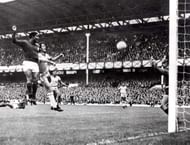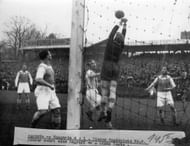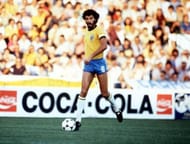Ask anyone you know, or even don't know, as to who they think would win the FIFA World Cup this year, and you would hear the same set of fancied nations: Germany, Spain, France, Brazil or Argentina, the latter two being eternal sweethearts of the public. A few self-anointed experts might even root for Belgium's golden generation, while the ones backing England can only be termed adventurous with their guesses.
While it still remains anybody's guess as to who receives the coveted golden trophy from Gianni Infantino at the Luzhniki Stadium in Moscow on the 15th of July, it will almost certainly be one of the nations mentioned above (unless Portugal gatecrash the party like they did two years ago in France). Fairytales are common at the World Cup, and the group stage itself has thrown up a few unexpected results - none more so than Mexico trumping Germany - but the underdog has historically run out of steam before the final.
However, if you're a fan of any of the nations generally being backed to emerge victorious, it might still be a wise idea to not bring out the confetti just yet. Over the years, teams that have been overwhelming favourites - and rightly so - have fallen short of World Cup glory, despite them being labelled as the most deserving.
This article chronicles their stories; the five best teams to have never won the World Cup.
#5 Portugal (1966)

By no stretch of the imagination is this saying that Bobby Moore's England did not deserve to win the 1966 edition of the global footballing extravaganza, but quite a few fancied Portugal, and why not? The core of that Portuguese team comprised of players playing for Benfica, winners of the European Cup in 1961 and 1962.
Benfica were the first team to dethrone Real Madrid from their previously unchallenged perch of being European champions. And in Eusebio, they had arguably one of the best forwards in the history of the game. Portugal waltzed through their group and even managed to comprehensively beat Pele's Brazil 3-1.
The highlight of their campaign, though, was the thrilling quarter-final against surprise packages North Korea. The Asian novices raced into a 3-0 lead at halftime and were looking good to deliver the shock of the tournament.
Eusebio, however, had other plans and hammered in four goals as Portugal completed a spectacular turnaround to win 5-3 to qualify for the semi-finals where they were up against the hosts, England, who pipped them 2-1 as they went on to eventually win. Portugal defeated the mighty Soviets by the same scoreline as their defeat in the semis in the third-place playoff to secure their highest ever finish. Eusebio would emerge as the top scorer with nine goals and firmly establish himself as a legend of the game, who almost led his entertaining team to the World Cup on their maiden appearance.
#4 Austria (1930s)

The pre-war Austrian team was one of the best teams that ever graced the game. Under the leadership of coach Hugo Meisl, the "Wunderteam" would regularly destroy teams, like their 6-0 victory over Germany and their 8-2 hammering of Hungary.
Having won the Central European Championship in 1932, they entered the World Cup in 1934 as one of the favourites. Their attacking play won over the fans quickly with special praise reserved for prolific goalscorer Pepe Bican and more so for the prodigious talent of Matthais Sindelar.
Nicknamed 'The Paper Man' for his slight build, Sindelar would wreak havoc with his silky skills and deft movement, which orchestrated his team's run to the semi-finals in 1934. Their loss to Italy was overshadowed by claims of alleged bias that the referee had towards the latter.
The Wunderteam would continue to dazzle and picked up the silver medal in the 1936 Munich Olympics, again losing to Italy in the final. They qualified for the 1938 edition of the World Cup too and were being backed to finally be crowned World Champions when Nazi Germany went ahead with 'Anschluss' and annexed Austria.
The heroes of the great Austrian team refused to be capped by the nation that captured their fatherland in that year's World Cup, not helping the already tense atmosphere. The Wunderteam's fall from grace was completed under tragic circumstances when their star Sindelar was found lying dead in his apartment. While it was reported as an act of suicide, many still claim that he was murdered by the Gestapo for his outspoken views.
#3 The Netherlands (1974 and 1978)
Modern football owes a lot to the Dutch, and particularly to Rinus Michels, the Ajax coach at the time who revolutionized football as we know it. He actively propagated his theory of 'Total Voetbol' or Total Football, wherein defenders would also attack while attackers defended from the front. No one understood his vision better than his protege, Johan Cruyff.
Michels built his virtually unprecedented 4-3-3 formation around Cruyff with astounding results. Ajax won the European Cup in 1971, 1972 and 1973 and the silky midfielder became a legend overnight. The hopes of a nation were pinned on Cruyff's back as he sought to reproduce his club success on a national level at the 1974 World Cup.
And reproduce it he did. The world looked on, amazed, as The Netherlands, in their bright orange kits, played football like never before. They eased past the first round and dumped out defending champions Brazil in the second round to set up a mouthwatering final against the hosts, West Germany.
Johann Neeskens converted a second-minute penalty to give the Dutch the advantage in the summit clash and the revolution was almost complete. The Germans, however, were in no mood to give up, and Paul Breitner equalized with a penalty of his own before legendary striker Gerd Muller struck to hand the advantage to the hosts.
Cruyff was barely allowed any space in the second half by German defensive duo Beckenbauer and Schwarzenbeck, and they held on to win the World Cup for the second time in their history.
The Dutch, though disheartened, were at it again in 1978, dazzling opposition after opposition with their fluid interplay and movement. Once again arguably the best team of the tournament, they waltzed their way into a second successive final, once again facing the hosts, Argentina, who took the lead through their star Mario Kempes. Kempes scored again in extra time - after the Dutch had equalized - to earn Argentina their first world title.
But while the Dutch had no titles to show for their efforts, they practically invented football as we know it, while also giving the world Johan Cruyff, one of the most celebrated players to take the field.
#2 Brazil (1982)

Brazil had not won the World Cup since 1970. Twelve years was way too long for them, and for the 1982 edition in Spain, they brought together attacking firepower rarely seen before - Zico, Eder, Socrates, Falcao and the like.
The first round saw them score eleven goals in four games. But more importantly, it seemed to the average viewer that the Brazilians had magic dust sprinkled on their boots. They were playing football from a different planet and leaving everyone in their wake. Fans who were lucky enough to watch them play unanimously declared them the winner even before the second round was played, where the Brazilians were drawn against Italy and Argentina.
The game against arch-rivals Argentina was billed as a showdown between Diego Maradona and Samba flair, and the former was no match for the latter. Brazil blew away Argentina 3-1 and went into the game against Italy knowing that a draw would take them to the semifinals. The Italians led twice, both goals scored by Paolo Rossi, and on both occasions, Brazil clawed back to equalize.
With the scores level at 2-2, any other team needing a draw would've been content. Not Brazil - they went for the winner and were still committed to attacking. Alas, World Cups are won on pragmatism, something this idealist Brazil side didn't have. Their constant attacks left spaces at the back for the Italian forwards, which they duly exploited - Paolo Rossi scored the winner for Italy, bundling out the magical Brazilian side who surely deserved the Cup.
Their philosophical midfielder Socrates, however, was unrepentant at the manner in which they exited - to him, "what matters is joy", and they gave fans of the beautiful game plenty of it.
#1 Hungary (1954)
England's misplaced superiority complex when it comes to football is pretty well documented. They christened themselves as the best team in the world without ever kicking a ball in the World Cup, and when they did turn up in the 1950 edition, they were beaten by the United States, a team comprising plumbers, mechanics and truck drivers.
However, because modern football was invented in England, beating them at their Wembley home in London was still the pinnacle every team aspired to reach. It was easier said than done, though, as England routinely dispatched teams with embarrassing scorelines. Until Hungary turned up.
The Hungarian team was a pretty powerful force in football in the pre-war years, having competed in the knockout stages of the World Cups they took part in. But, given the general English preoccupation with themselves, the Hungarians were invited for a friendly to London in 1953 with the locals widely expecting a hammering in favour of the home side. What a packed Wembley saw that day shocked them to their very core.
The Hungarians demolished England 3-6 in what turned out to be one of the greatest friendlies of all time. The notorious English press were infatuated by the Hungarians' ultra-attacking style, led by the legend Ferenc Puskas, and they give their vanquishers a name that still makes the England fan shudder - the Mighty Magyars were born.
Not that the Hungarians were surprised by the scoreline. They had already bagged the 1952 Olympic Gold and the 1953 Central European Championship with remarkable ease and were ranked as the best team in the world. The way in which the English were dismantled left the latter smarting, and a return match was organized in Budapest, with England keen to prove that their shocking collapse at Wembley was just an anomaly.
The message clearly failed to reach the Hungarians, who tore into England once again and this time, thumped them 7-1. By the time the 1954 World Cup came along, anything but a Hungarian victory would have been the surprise. And true to pre-tournament predictions, Hungary reached the final without breaking a sweat - their campaign included a 9-0 dismantling of Switzerland and an 8-3 shellacking of West Germany, who recovered in time to make it to the final themselves.
Hungary took a two-goal lead in no time and looked set to be worthy winners of the World Cup, but Germany turned a thrilling final on its head by scoring thrice to emerge 3-2 victors in the 'Miracle Of Bern'. The World title was snatched away from Hungary - a team that lost only once between 1950 and 1956 when the Hungarian Revolution brought down the curtains on this team. Hungarian football has never reached those dizzying heights ever again.
